In recent years, the films produced by the Bombay industry have become synonymous to many with dewy love stories/NRI fantasies, with all the depth and grace of a Hallmark greeting card; combined with the (welcome) decline of what used to pass as parallel cinema in the Hindi film industry (welcome because much parallel cinema simply confused realism and angst with high art, and ended up boring everyone in the audience), this has meant that for those not in school or those not simply desirous of remembering the motherland as if through a cartoon prism, there has been precious little to cheer about where Hindi cinema is concerned, the exceptions that prove the rule notwithstanding.
Beyond Bhai-Bhai
<i >Dev</i> goes beyond usual pieties and refuses to succumb to the easy, banal secular-communal divide-- it offers a meditation on ethical obligation and responsibility, from within the Hindu tradition.
None can accuse Govind Nihalani's Dev of either the sort of addled lovesickness or pointless bellowing that has plagued Hindi cinema in years past. In constructing a tale of two senior police officers set against a backdrop of communal violence (a tale that should have become stale by now; that it has not is sad testimony to our propensity to slaughter each other), Nihalani is scrupulous, grief-stricken, and quite clever. But that is not all; he has that rarest of qualities in a film that bills itself as a "commercial" film: unexpectedness.
What makes Dev unexpected is its refusal to succumb to the easy secularism/liberalism of "Hindu-Muslim bhai bhai" ("Hindus and Muslims are brothers"), or of the notion that "the people are basically good, no matter of what community." I stress that these are not mean or contemptible notions by any means (indeed I would argue that the notion of the fraternity of Indians, of whatever religious affiliation, and even of none, is the very essence of citizenship), merely that these are rather banal or unremarkable ones (to the extent they would be particularly welcome, it speaks volumes on the pass we have come to).
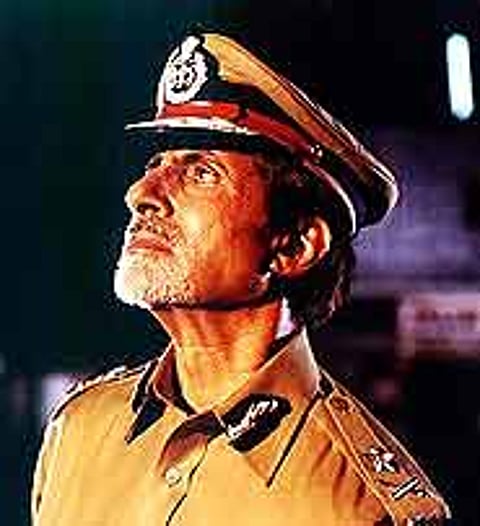
Dev gives us something far more rich and strange than Dev (played by Amitabh Bachchan), the Nehruvian secularist, versus Tejinder Khosla, the hard-core adherent of Hindutva (Om Puri); Dev offers a meditation on ethical obligation and responsibility, from within the Hindu tradition. Bachchan's character is no card-carrying secularist: at the film's outset, he is quite aggrieved by what he sees as the politics of "minorityism", and his demeanor when meeting with certain Muslim clerics, combined with a stray remark during the interrogation of a Muslim suspect, and his lack of vehement protest at the extreme views articulated by Om Puri's Khosla (a close friend) all confirm the impression.
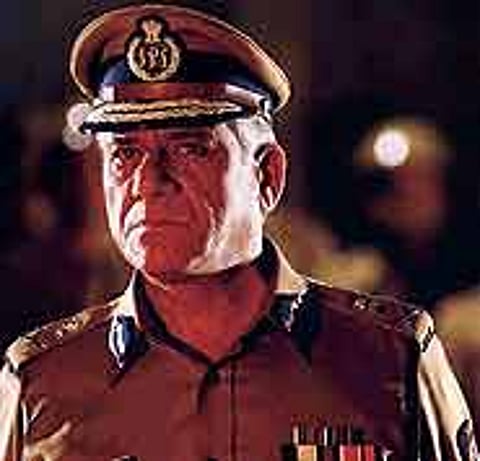
Indeed, his strongest disagreement with Khosla in the first half of the film is with the drastic nature of Khosla's methods, Om Puri's grizzled senior police officer being of the "get rid of them all" persuasion. Nihalani appears to have cast his lot in with the Khoslas of the world in the first half of the film, replete as it is with anti-national politicians, a bitter Farhan Ali (played with unsurprising ineptitude by Fardeen Khan) determined to assassinate DCP Dev to avenge the death of his father, and even a Muslim Gandhian who, we learn, has been tormented for decades by his having murdered (during the 1969 Ahmedabad violence) an unarmed Hindu, and by the fact that his life is ultimately saved by yet other Hindus. In short, Nihalani constructs the first half of the film so as to air just about every stereotype about Muslim Indians currently prevalent-- yet all this is, in a sense, sleight of hand: Nihalani attempts to seduce the viewer, all the better to startle him/her.
The second half of the film is occupied by depictions of communal violence, led by prominent members of the state's ruling party, and by Dev's inability to prevent some of the worst outrages. By way of background, Dev reports to Khosla, who has been especially appointed by the ruling party, and part of his job description apparently includes ensuring that the "people's sentiments" are respected when Muslims are massacred after a bomb explosion at a temple of Ganesh, although the massacres are committed by the cadres of the ruling party. Dev's report on the burning of a basti (reminiscent of Naroda Patiya) threatens to embarrass the government, and he is slain by his friend Khosla as he is ascending the steps of the courthouse to hand his report in. Khosla himself ultimately commits suicide, haunted by his betrayal of a one-time friend.
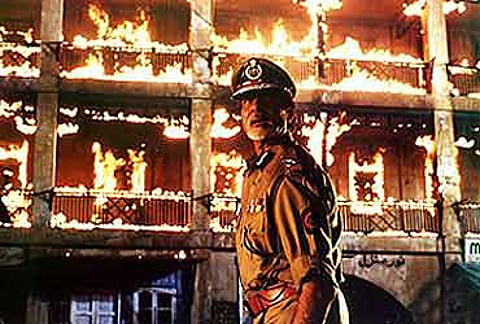
What is one to make of this film, specifically of the juxtaposition of its two halves? One way of reading the film would be to interpret its first half as presenting "the Muslim" as a "problem," or perhaps more accurately, as "problematic". For Khosla, this definitional issue settles the entire debate: he sees a problem to be solved, indeed a problem with only one solution. The film's second half, however, jolts the viewer out of any uncritical acceptance of Khosla's views, and does so by illustrating the enormous gap between the "problem" and Khosla's proffered solution. To put it another way, whereas for Khosla there is no ethical issue to be considered once he has settled the definitional one in his mind, for Dev it is precisely the opposite. From the first half of the film, he does not appear to be the standard left-liberal secularist, and it would be a mistake to read the second as inverting this; for Dev it is simply the case that the definitional issue does not settle the ethical question. Indeed, for the film as for its lead protagonist, it is only when the definitional issue is deemed settled that the ethical conundrum begins.
Thus the central question Dev grapples with is not who "the other" is or how this "other" is to be defined, categorized, characterized--not, that is, a metaphysical question but an ethical one: how is one to be with respect to one who has been marked out as "other"? What is one's obligation and responsibility in such a situation? Through all of this, the Gita casts a long shadow over Dev (indeed the film begins with a sloka from the Gita), and more particularly with a certain interpretation of the famous Krishna-Arjun dialogue at the text's core.
When Dev thinks of exposing those who perpetrated or were complicit in atrocities, he begins to write a report-- presumably he thinks (at least at that point) that submitting such a report will make a difference. Certainly that appears to be at one point Farhan Ali's primary concern-- towards the end of the film, he asks Dev if the latter really feels that writing such reports will make a difference; Dev says that it will make a difference, though he does not seem to say this with any great conviction, almost as if he himself were in need of such consolation.
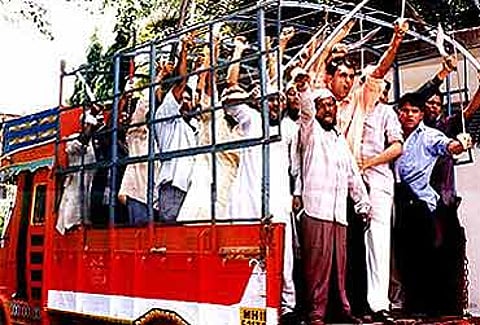
Shortly thereafter, however, all such doubt has melted away for Dev: in a scene reminiscent of the Krishna-Arjun dialogue in the Gita, Dev explains to Farhan that the crucial thing for a warrior is not whether he lives or dies, but that he fights; likewise, as a police officer his dharma, his infinite obligation in a sense, is to do his duty and serve the constitution. Dev does not serve the constitution because he seems to have analyzed it and found it to be a good document, but because as a police officer it is his dharma to do so. Implied here is a gentle rebuke of Farhan in the previous scene, who seems to be suggesting that struggling in this manner and writing such a report would only be worthwhile if it "made a difference"; Farhan, in short, subscribes to an instrumental logic that is quite alien to Dev's worldview in the next scene. DCP Dev does what he does because he cannot do otherwise and yet be DCP Dev. Farhan, I would argue, takes the lesson to heart, and the last scene of the film shows him ascending the courthouse steps to practice as the lawyer he had trained to be, but had never actually been, preferring more violent modes of being.
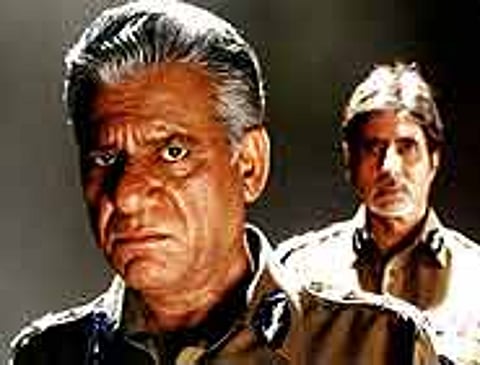
The dharma of Dev is not the dharma of Khosla; indeed it seems doubtful that "dharma" is a word that would have much resonance to Khosla, for all the latter's obsession with "Hinduness". Nihalani's barb at Hindutva cannot be missed: for all the talk of affirming the "Hindu-ness" of India, the political ideology Khosla subscribes to is really quite uninterested in Hinduism or Hindu philosophy, preferring to mortgage them at the altar of nineteenth century Western-style nationalism, dreaming of an India co-extensive with a spirit, the spirit in turn animating the volk, in the image of dutiful German, French, and other nationalists of eras gone by.
Dev, who is depicted as far more devoutly Hindu than his friend, is by the end of the film a "traitor" to "his own" according to Khosla -- a dialogue that reveals how little Khosla has to do with Dev's Gita. "Meri Gita shakti ki Gita hai" ("My Gita is the Gita of Strength) Khosla says at one point early in the film; we are never told what Dev's Gita is. That it is irremediably other than Khosla's own is revealed to him when Farhan confronts him after Dev's death; Khosla asks Farhan to come to his apartment to collect some of Dev's things. Once there, Farhan accuses Khosla of having killed Dev, and refers to the latter as his "roohani pita" ("spiritual father"). Bewildered by this, Khosla finally sends Farhan away, telling him that he (i.e. Khosla) has nothing of Dev's with him; when Farhan's back is turned, Khosla shoots himself.
The logic of Nihalani's film brings one to this pass: Khosla has done all he has in the name of "the Hindu," yet in the course of doing his all he feels compelled to murder the most classically Hindu of all the film's characters, indeed one who is at different points Arjuna and Krishna in the film (and indeed who is even named "Dev" ("god")). I would argue that Khosla does not realize until the instant he shoots himself that he has horribly compromised his ultimate referent--Hindu/Hinduism--while claiming to serve its cause, and has ended by killing Dev, thereby symbolically destroying the referent. Once this has happened, there is no ground left for Khosla himself to stand on, who prefers to end his life rather than make his way through the dark realization that he has betrayed that which he claimed to serve.
In the world of Dev, there will be no Hindu dharma left if the Khoslas of the age hold sway-- the targeting of Muslims in Dev is thus not just the killing of innocents (thought it is manifestly that), it is also the losing of one's soul, a fratricide that ends in a suicide.
Umair Ahmed Muhajir, 26, is a lawyer in New York City.
Tags